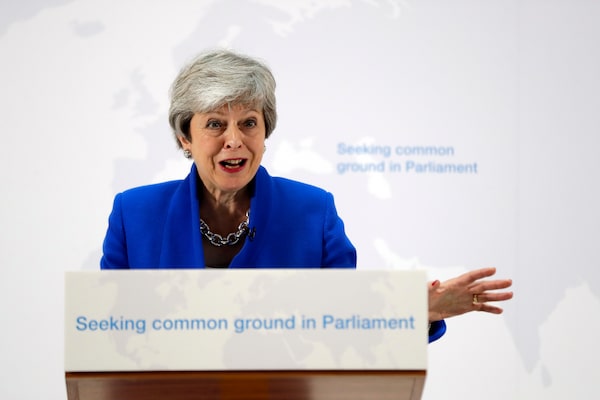
In an impassioned speech Tuesday in London, British Prime Minister Theresa May outlined what she called 'a new Brexit deal' and urged MPs to get behind it.Kirsty Wigglesworth/The Associated Press
British Prime Minister Theresa May has unveiled a series of proposed changes to her Brexit deal with the European Union in the hope they will be enough to finally win parliamentary approval for the agreement.
In an impassioned speech Tuesday in London, Ms. May outlined what she called “a new Brexit deal” and urged MPs to get behind it. “I say with conviction to every MP of every party: I have compromised. Now I ask you to compromise too,” she said.
The new proposals are meant to address the concerns of a growing number of MPs who have rejected the deal three times by a wide margin. But it’s far from certain Ms. May will be able to win over enough converts: many MPs, including a group of rebels within her Conservative Party caucus, have already come out against the new plan, and pressure is mounting on the Prime Minister to resign.
The changes proposed Tuesday by Ms. May include keeping the United Kingdom in line with EU regulations on workers’ rights and environmental protection. She also plans to give MPs an increased role in future negotiations with the EU on a trade deal and a say in whether the country should remain in a customs arrangement with the bloc, which would allow for the free movement of goods. MPs would also have an opportunity to vote on whether to hold a second referendum on Brexit. The new plan “is practical. It is responsible. It is deliverable. And right now, it is slipping away from us,” she said.
Ms. May has been trying to win parliamentary approval for the Brexit deal since last November. Britain’s departure from the bloc was supposed to happen March 29, but the EU has extended the deadline to Oct. 31. Ms. May acknowledged Tuesday that her latest plan, which will be put to Parliament in early June in the form of a bill, represented “one last chance” to get the deal approved. She warned MPs that if they voted against it for a fourth time, they would be voting against Brexit. “If they do so, the consequences could hardly be greater,” she said. “Reject this deal and leaving the EU with a negotiated deal any time soon will be dead in the water.”
The new proposals appear to be too little too late, and opposition to the proposed bill has been growing. A group of Ms. May’s fellow Conservative MPs said Tuesday that they will vote against it – including several MPs who supported the Brexit deal on previous occasions in the House of Commons.
Many Tory MPs have been calling on Ms. May to resign this summer. They worry that if Parliament were to approve the revised deal it would bind the hands of the next party leader, who would also take over as Prime Minister. Ms. May has offered to resign once the deal is passed, but she has been vague about when she would step down if it is rejected. That has led to a revolt among Tory MPs who have demanded that she quit after the vote regardless of the outcome. The backlash has forced her to agree to discuss her future with caucus members next month once the vote has concluded.
“I wouldn’t put money on my backing the deal,” Tory MP Jacob Rees-Mogg said Tuesday. Another Tory rebel, MP Mark Francois, said Ms. May’s new plan was “dead on arrival.”
The opposition Labour Party has also come out against the new plan despite spending six weeks negotiating changes with the Prime Minister. Those talks collapsed last week, largely over Labour’s insistence on the U.K. remaining within the EU’s customs union. Ms. May’s proposed plan "doesn’t inspire confidence, and I don’t think that many of our members will be inspired by it,” said Labour MP John McDonnell.
Much of the opposition to Ms. May’s Brexit deal has to do with the backstop provision, which would keep Northern Ireland largely bound to EU regulations in order to avoid a hard border with Ireland. Many Tory MPs say that violates the spirit of Brexit because it would keep the U.K. bound to the EU. Ms. May tried to address those complaints Tuesday by proposing to seek alternatives to the backstop and offering Northern Ireland’s assembly more say in how the backstop would be implemented. But that hasn’t eased the concern of many Tory MPs who want the backstop scrapped.
Northern Ireland’s Democratic Unionist Party (DUP), whose 10 MPs prop up Ms. May’s minority government, has also been cool to the new proposals, and on Tuesday its MPs said they would wait to see more details. “We will have to await the publication of the text of the bill to see what the proposals actually mean, but the fact is that the fatal flaws of the draft [Brexit deal] remain,” said Nigel Dodds, the deputy leader of the DUP, in a statement.
 Paul Waldie
Paul Waldie